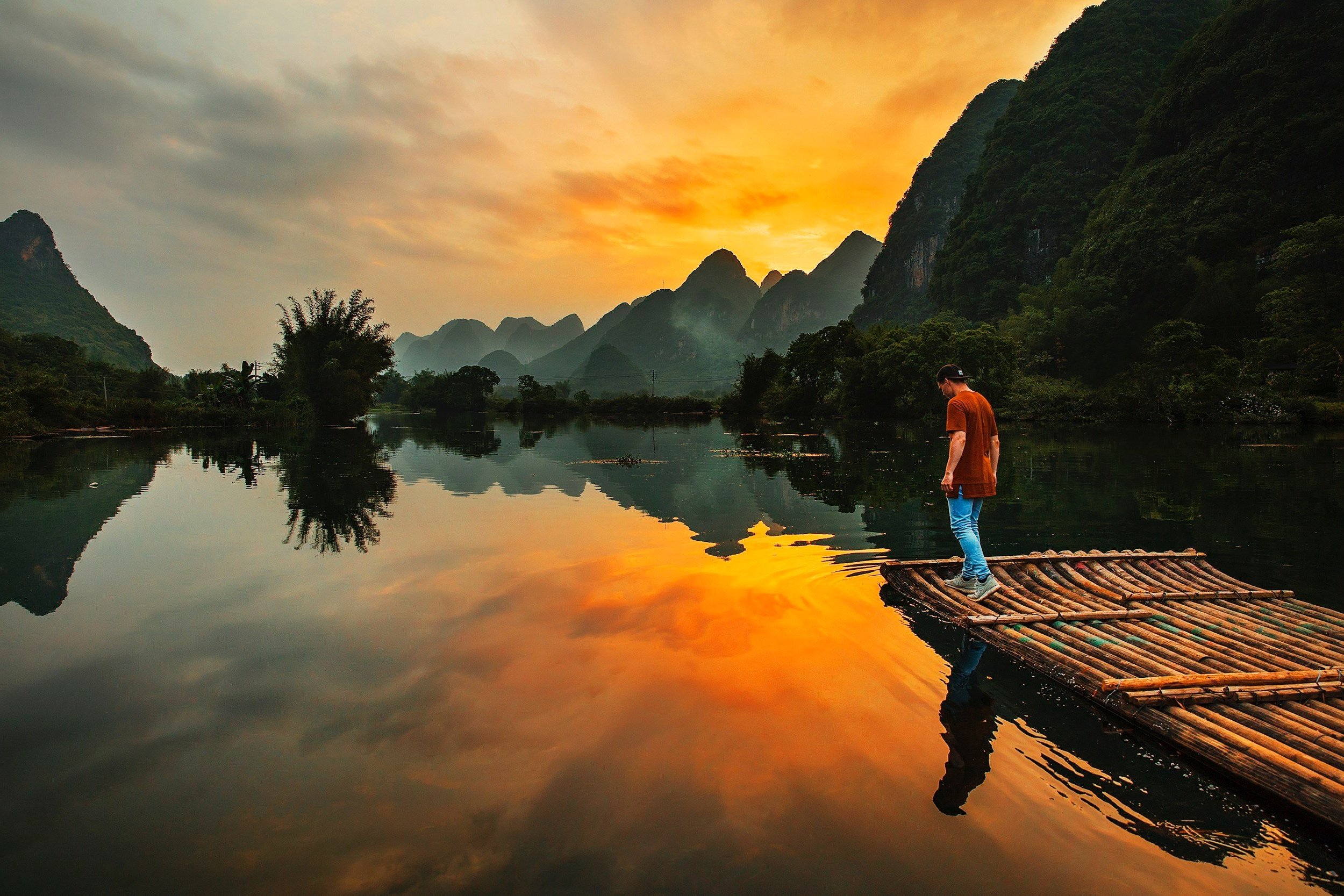
China Travel Guide
China: Bigger, Stranger, Deeper Than You Think
China doesn’t reveal itself quickly. At first, it overwhelms. It’s noisy, coded, fast, slow, strict, warm, poetic, pragmatic, political, peaceful — all at once.
It’s temples beside skyscrapers, censorship beside TikTok dances, dumplings beside durian. You don’t “do” China. You negotiate with it, stumble through it, then slowly fall for it.
Come for the Great Wall. Stay for the early morning tai chi in a foggy park.
Scroll down for more travel photos.
Quick Facts
Capital: Beijing
Population: Over 1.4 billion
Language: Mandarin Chinese (Putonghua), plus dozens of dialects and regional languages
Currency: Chinese Yuan (RMB/CNY)
Time Zone: China Standard Time (UTC +8), one time zone for the entire country
Climate: Varies wildly – from Siberian winters to tropical summers
Visa Requirements: Tourist visa (L) required for most nationalities – apply in advance
Top Religions: Buddhism, Taoism, Confucianism, Folk religions
Safety: Generally safe – surveillance is high, crime is low
Transport: Bullet trains, metros, buses, shared bikes, WeChat
Vibe: Structured chaos, ancient rhythm, modern flash
Best for: History nerds, food lovers, infrastructure enthusiasts, the truly curious
Top 5 Attractions
1. The Great Wall (near Beijing)
Yes, it's massive. Yes, it's worth it. Hike a wild, unrestored section to feel the silence.
2. The Forbidden City (Beijing)
A maze of history and imperial stillness in the middle of a modern megacity.
3. The Terracotta Army (Xi’an)
Thousands of silent warriors buried for an emperor’s afterlife. Still eerie. Still powerful.
4. Zhangjiajie National Forest Park
Avatar-like stone pillars rising from the mist. Unreal landscapes made real.
5. Chengdu & the Giant Pandas
Pandas eating bamboo, and you eating hotpot — both life-affirming.
Activities
Slurping hand-pulled noodles in a street stall
Morning tai chi in public parks
Hiking in Tiger Leaping Gorge or the Yellow Mountains
Riding bullet trains across provinces
Visiting Buddhist, Taoist and Confucian temples
Learning to use chopsticks without stress
Scrolling Dianping instead of TripAdvisor
Culture & Etiquette
Don’t expect personal space — it’s a team sport here
Slurping = enjoyment
Elders come first — always
Don’t stick chopsticks upright in rice (funeral symbol)
Expect direct questions: “How old are you?” “Are you married?”
Gift-giving is a complex art (ask a local)
“Face” (reputation/status) matters deeply — don’t embarrass others publicly
What Not to Do
Don’t discuss politics — especially Taiwan, Tibet, Xinjiang, or the CCP
Don’t use Google, WhatsApp or Instagram without a VPN
Don’t tip (unless in tourist-heavy places — it’s not expected)
Don’t ignore air pollution alerts in cities
Don’t jaywalk casually – even if everyone else does
Tipping in China
Tipping in China is not expected — and in many places, it’s even considered strange.
Here’s how it plays out:
Restaurants:
Tipping is generally not practiced. Most locals don’t do it, and staff often won’t accept it. Some Western-style restaurants in big cities may include a service charge, but no tip is needed.Taxis:
Don’t tip. Round up if you like — but it’s not expected, and might be refused.Hotels:
In basic hotels: no tipping.
In high-end or international chains: tipping porters or housekeeping (¥10–¥20) is okay, but still not required.Tour guides / private drivers:
This is the one exception. If you’re on a private or long group tour, guides and drivers do expect a tip, especially if they go above and beyond.
Standard: ¥50–¥100 per day for guides, ¥30–¥50 per day for drivers.
How to tip (if you do):
Do it discreetly and respectfully. Don’t make a show of it. Smile, and use two hands when giving money — it’s considered polite.
Pro tip:
Don’t be offended if your tip is refused. It’s often more about custom than rejection.
In China, offering help or good service is often considered part of the job, not something you pay extra for.
Cannabis in China (as of 2025)
Cannabis is strictly illegal. Possession, use, or trafficking can lead to very harsh penalties, including prison or worse. Even trace amounts can land you in serious trouble. Don’t risk it. Not even a puff.
Please note: Always check the current laws and regulations at the time of your travel to Thailand, as they may change after this information was published. I am not responsible for any legal issues arising from changes in the law.
Destinations by Region
North China
Beijing – Imperial history meets digital future
Datong – Hanging monasteries and Buddhist cave art
Harbin – Ice festivals, Russian architecture, sub-zero charm
East China
Shanghai – Sky-high, river-bright, globally tangled
Hangzhou – Tea fields, lakes, and poetry in motion
Suzhou – Classical gardens and slow canals
West China
Xi’an – Ancient capital, Muslim Quarter food scene
Gansu & Dunhuang – Silk Road caves and desert magic
Tibet (with permit) – Monasteries, altitude, and soul-stirring landscapes
South China
Chengdu – Laid-back, spicy, panda-friendly
Guilin & Yangshuo – Karst peaks, river drifting and countryside stillness
Guangzhou – Dim sum, megamalls, and old-school Cantonese soul
Southwest & Yunnan
Dali & Lijiang – Old towns with mountain backdrops
Shangri-La – Tibetan-influenced highland escape
Xishuangbanna – Tropical borderlands near Laos & Myanmar
Final Note
China won’t make it easy. But that’s the point.
It’s a puzzle and a poem, a contradiction and a lesson.
You won’t always understand it — and it won’t always understand you.
But if you walk slowly, watch closely, and eat boldly…
you’ll leave with more questions — and that’s a gift.












